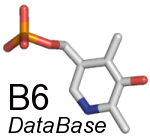|
|
| type |
Journal Article |
| authors |
Zummo FP, Marineo S, Pace A, Civiletti F, Giardina A, Puglia AM |
| title |
Tryptophan catabolism via kynurenine production in Streptomyces coelicolor: identification of three genes coding for the enzymes of tryptophan to anthranilate pathway |
| journal |
Appl Microbiol Biotechnol |
| Activity |
3.7.1.3 |
| Family |
3.7.1.3 |
| sel |
selected |
| ui |
22234533 |
| year |
(2012) |
| volume |
94 |
| number |
3 |
| pages |
719-28 |
| | |
|---|
| keywords |
doi: 10.1007/s00253-011-3833-y |
| abstract |
Most enzymes involved in tryptophan catabolism via kynurenine formation are highly conserved in Prokaryotes and Eukaryotes. In humans, alterations of this pathway have been related to different pathologies mainly involving the central nervous system. In Bacteria, tryptophan and some of its derivates are important antibiotic precursors. Tryptophan degradation via kynurenine formation involves two different pathways: the eukaryotic kynurenine pathway, also recently found in some bacteria, and the tryptophan-to-anthranilate pathway, which is widespread in microorganisms. The latter produces anthranilate using three enzymes also involved in the kynurenine pathway: tryptophan 2,3-dioxygenase (TDO), kynureninase (KYN), and kynurenine formamidase (KFA). In Streptomyces coelicolor, where it had not been demonstrated which genes code for these enzymes, tryptophan seems to be important for the calcium- dependent antibiotic (CDA) production. In this study, we describe three adjacent genes of S. coelicolor (SCO3644, SCO3645, and SCO3646), demonstrating their involvement in the tryptophan-to-anthranilate pathway: SCO3644 codes for a KFA, SCO3645 for a KYN and SCO3646 for a TDO. Therefore, these genes can be considered as homologous respectively to kynB, kynU, and kynA of other microorganisms and belong to a constitutive catabolic pathway in S. coelicolor, which expression increases during the stationary phase of a culture grown in the presence of tryptophan. Moreover, the S. coelicolor ΔkynU strain, in which SCO3645 gene is deleted, produces higher amounts of CDA compared to the wild-type strain. Overall, these results describe a pathway, which is used by S. coelicolor to catabolize tryptophan and that could be inactivated to increase antibiotic production. |
| last changed |
2018/11/13 14:49 |
|











